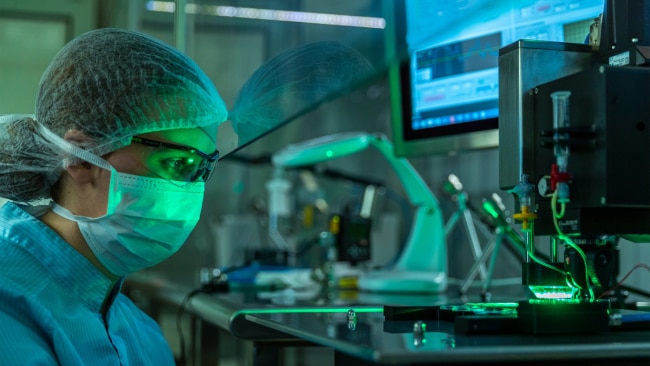Antimicrobial lipopeptides ball up to bind to bacteria cell membranes
Scientists have found how a compound can kill bacteria cells while leaving mammal cells alone.
Bacteria-fighting molecules work better in gangs than on their own, research has found, showing promise for the development of antibiotic drugs that can resist resistance.
A study published today in Biophysical Journal shows how antimicrobial lipopeptides, a class of synthetic compounds, bind to bacterial cell membranes while leaving mammal cell membranes alone. Alan Grossfield and Dejun Lin, from the University of Rochester Medical Centre in New York, revealed that the key to this preferential binding was the formation of molecules into balls called micelles. Individually the molecules were as likely to attach to mammal cells as bacteria.
“The biggest surprise was that the binding kinetics — in essence, how quickly the lipopeptides get into the membrane — are crucial to understanding how they work,” Dr Grossfield said. “It turns out that it’s not enough to look at the drug molecule itself, it’s also important to consider whether it works by itself or as part of a group. The micelles attack bacterial membranes much faster, which explains why they kill bacteria without hurting the infected animal.”
AMLPs have previously been shown to act against a range of disease-causing bugs and clear infections in mice, but their mode of action has been poorly understood on a molecular level, according to the paper.
What is known is that they should be much harder for bacteria to evolve resistance to than traditional antibiotics. To stop the AMLPs attaching to their cells, bacteria would have to change the composition of their membranes — radical and complex changes that would not only be unlikely to occur, but would also tend to stop their own proteins from functioning, the authors say.
Widespread resistance to antibiotics is a looming catastrophe for public health systems, which rely heavily on them not only to fight specific diseases such as tuberculosis, but to prevent infections in common surgical procedures. They are also widely, and controversially, used in livestock.
Overuse of antibiotics is discouraged because it promotes resistance. Because bacteria generate so quickly and in vast numbers, there is always the chance of mutations spontaneously arising that promote the organism’s survival. When the drug kills most of the bugs in a host, it leaves the field free for the mutant bacteria to thrive and spread.
Research into finding new antimicrobials is hampered by the lack of commercial incentive: unlike mass-market drugs, these have to be used as sparingly as possible, which makes the investment harder for pharmaceutical companies to recoup.



